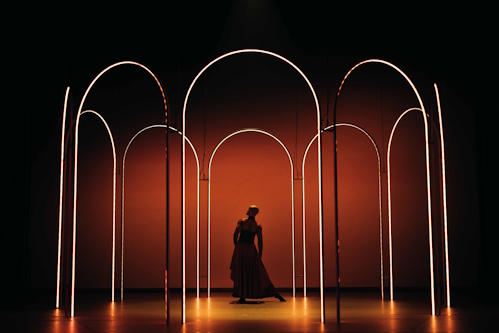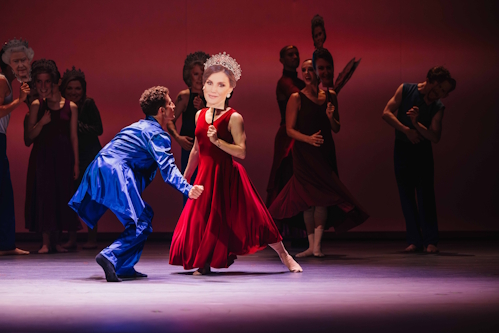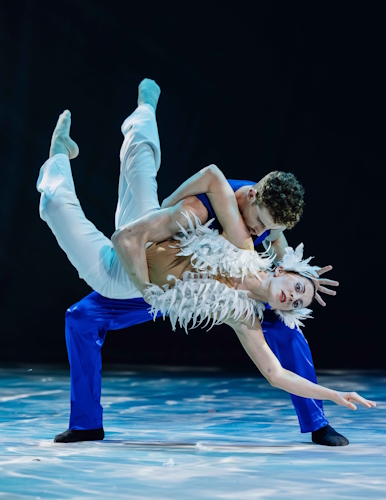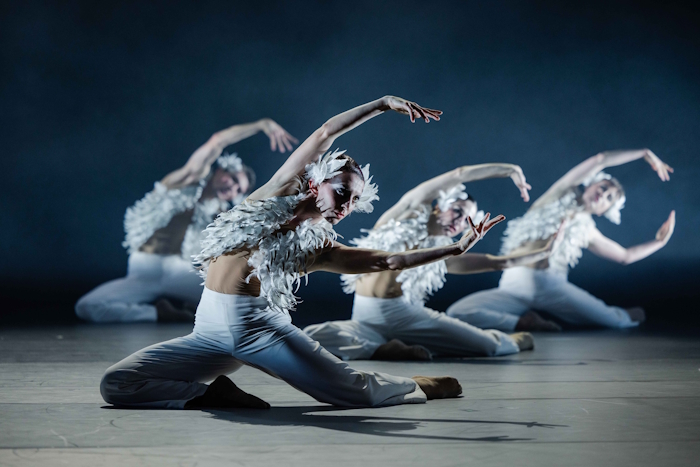Theater Pforzheim
November 20, 2025
Swan Lake. Schwanensee. I have sat through a lot over the years. But I can safely say that I have never felt a swan’s breath on the back of my neck. Until now. Because that’s precisely what happened during Act Two of Guido Markowitz and Mar Rodríguez Valverde’s new contemporary reinterpretation of the classic for the dance ensemble of Theater Pforzheim, a production that marks Markowitz’s tenth anniversary as dance director.
Having dancers enter through the auditorium is nothing new. But the Markowitz and Valverde take it much further. With Michael Borowski’s lighting bathing the audience in blue, the creatures slip in through the doors, gliding not only down the aisles but also along rows making very, very individual eye contact as they do so. They balance confidently on ledges that separate sections of seats. At one point, finding myself in a moving shadow, I turned to discover a swan high above standing on a ledge. The effect is to emphasise the reality of these creatures rather than having them seen purely as distant and mythical. It’s a terrific piece of immersive theatre, yet so simply done.

in Swan Lake by Guido Markowitz and Mar Rodríguez Valverde
Photo Andrea D’Aquino
The tweaks to the story are many, however, although the essentials are all still there. We still have a Prince Siegfried who his mother would like to see married, but who would rather enjoy himself. But the celebration at which he is supposed to choose his bride starts early. Having slipped away from the festivities to go hunting, Siegfried and Benno, who produces a rifle rather than a crossbow, stumble across the usual ruin by a lake.
One of a number of gender-fluid twists to the tale, the queen is danced by a male, here Willer Rocha, in elegant red dress and wearing a strap-on crown on his bald head. Encouraging Siegfried, dressed in a shiny royal blue suit and danced by the excellent Timothé Durand Caulliez, to choose a bride, (s)he offers the prince pictures of princes and princess from various European royal families. Naturally, he rejects them all in favour of going hunting with Benno.

(pictured: Raphaël Besse as Siegfried and Ensemble)
Photo Andrea D’Aquino
Performed by Chaerin Gwak, another gender change from the usual, Benno, described simply as ‘Siegfried’s best friend’, wears a dog headpiece throughout. It does make one do a double take initially. But really canine or human? The choreography contains pretty much nothing in the way of dog-like references, so is the idea that he is really simply loyal and best friend? Not that it really matters anyway.
The swans in this production take human form at night, and that’s how we first meet them; as cleaners in overalls and with buckets and mops. There’s a bit of social commentary here, the workers/swans oppressed by Rothbart, their boss/sorcerer. But as daylight comes, they transform, and we discover they include both Odette and Odile. While there’s no sign of the traditional swan arms, other characteristics such as their aggressiveness when threated, and the way they move their heads and shake themselves to aerate their feathers, is cleverly integrated. And these swans do not move with the precision of a classical ballet corps. They are very much individuals.
Danced by Giulia Spinelli and Joshua-Frederick Pilgrim respectively, Odette and Odile’s differing personalities come through well. They are very much equals, however. This Odile is no antagonist, not evil, not manipulating. She’s simply a different person, a different swan, and from time to time she does step back and give her white cousin space. Odette is portrayed as a strong woman, determined to be free and find love. When both fall for Siegfried, it would be putting it mildly to say that Rothbart, is not best pleased.
As the sorcerer, Eleonora Pennacchini cut a wonderfully fearsome figure in black. Dressed in black, distinctly human, it is one of the best characterisations I’ve seen. It’s also a dancing role, which adds more layers and choreographic opportunities.

(pictured l-r: Sara Scarella as Odette, Ido Stirin as Odile,
and Raphaël Besse as Siegfried)
Photo Andrea D’Aquino
At the official ball the next day, both Odette and Odile mingle with the other guests. When Siegfried finds them, the joy of reunion is there for all to see. But that leaves Siegfried with the problem of which swan to choose. In a cleverly choreographed pas de trois in which the trio push and pull, one way and another, constantly changing partners, he finally opts for Odette, of course.
Markowitz and Valverde may have reinterpreted many things, but they can’t resist the cygnets. After a jokey opening, which sees them urge the conductor to ‘get on with it’, the humorous choreography includes numerous references to the familiar classical versions.

(with Raphaël Besse as Siegfried and Sara Scarella as Odette)
Photo Andrea D’Aquino
In this version, it’s Rothbart who gets dispatched after the other swans turn on him. But if you’ve ever wondered what happened to Siegfried and Odette afterwards in productions like this where both survive, Markowitz and Valverde give their answer, the ballet opening and closing with a vison of them in contented, if wizened old age.
Musically, the score has been rearranged, reordered, in line with the narrative. But then Tchaikovsky wasn’t averse to change either, making numerous amendments during his lifetime.
Indeed, most people would be surprised at what the original sounded like. The Black Swan fouetté music, for example, used here for a pas de deux for Rothbart and the Queen, was originally in Act One and had absolutely nothing to do with Odile. It was all played live with beautiful nuance by the excellent Badische Philharmonie Pforzheim under the baton of music director Michael Pichler
Swan Lake has been done so many times and in so many ways that it is difficult to come up with something new. But Markowitz and Valverde achieve just that. The gender fluidity certainly adds to the interest and doesn’t diminish the narrative in any way. The storytelling is effective and even the big waltz numbers work quite well despite the lack of numbers. And that magical few minutes when audience and swans meet will be something everyone will take home and remember.


